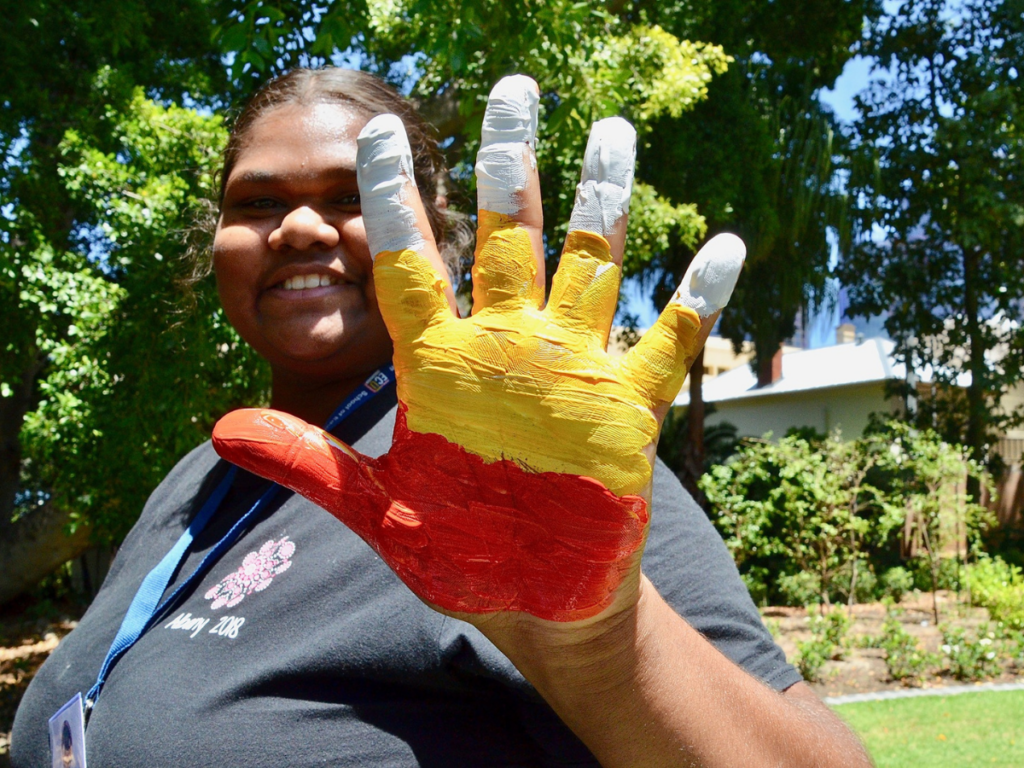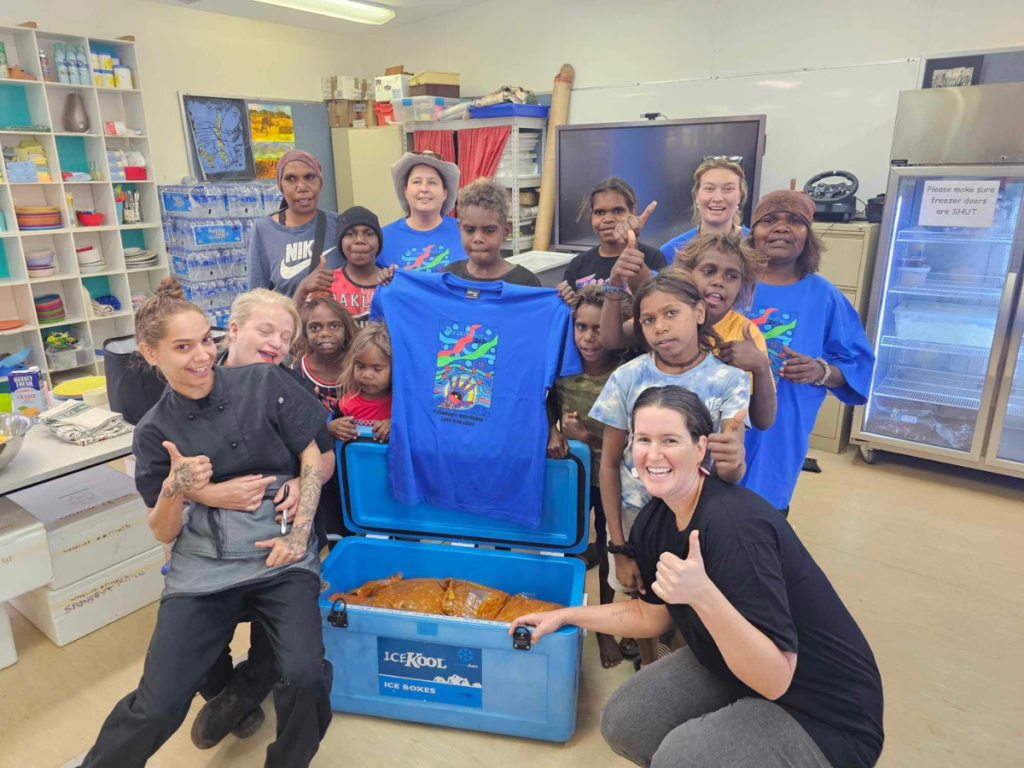Foundation for Rural & Regional Renewal (FRRR)
With support from a variety of generous supporters including The Sally Foundation, Seaton Foundation and Bunnings Warehouse, FRRR awarded $36,000 via six grants to not-for-profit community organisations in and around Lismore for a variety of projects aimed at supporting local youth.
The FRRR ABC Takeover Youth Catalyst Grants support communities to take action on the ideas generated by regional youth at the annual ABC Takeover Regional Summit. The annual Takeover Summit provides local students with a platform to speak up and have their voices heard on issues that matter to them within their own community.
The grants provide a mechanism for these ideas to become reality in their community, with project delivery intended to establish a greater connection between youth and community organisations; support youth to drive change in their community by backing their ideas; and ensure that young people are valued for their contributions and time.
| Organisation | Project | Location | Grant |
|---|---|---|---|
| Connect Northern Rivers Inc | Destine Create a film at the Connect Northern Rivier Career Expo to showcase local career pathways, increasing awareness and opportunities for young people in Lismore. | Lismore, NSW | $6,000 |
| Lismore City Council | High Schoolers' Haven Launch a youth-led pop-up event space in Lismore to foster social connections, support, and skills development for Lismore youth. | Lismore, NSW | $6,000 |
| Our Plan C Inc | NexGen Navigators: Trash Talkers Equip local youth with the skills to lead their own youth-led environmental projects to activate their environmental awareness and comunity resilience. | Lismore, NSW | $6,000 |
| Nimbin Neighbourhood & Information Centre Inc on behalf of Nimbin Youth Events | Youth Fest Create a youth-led festival that empowers young people to showcase their talents and develop event management skills to foster community connections. | Lismore, NSW | $6,000 |
| The Tropical Fruits Inc | StandUp StandOut Implement workshops to empower Lismores diverse youth through art, fostering self-pride, community connectinos and improved mental health. | Lismore, NSW | $6,000 |
| Creative Peoples Collective Inc | Culture Peoples Collective Empower youth through artistic workshops and events, fostering skills, self-expression and community cohesion. | Lismore, NSW | $6,000 |
Applications are now open for the 2024 ANZ Seeds of Renewal program, with grants of up to $15,000 available for not-for-profit organisations and community groups in remote, rural and regional Australia.
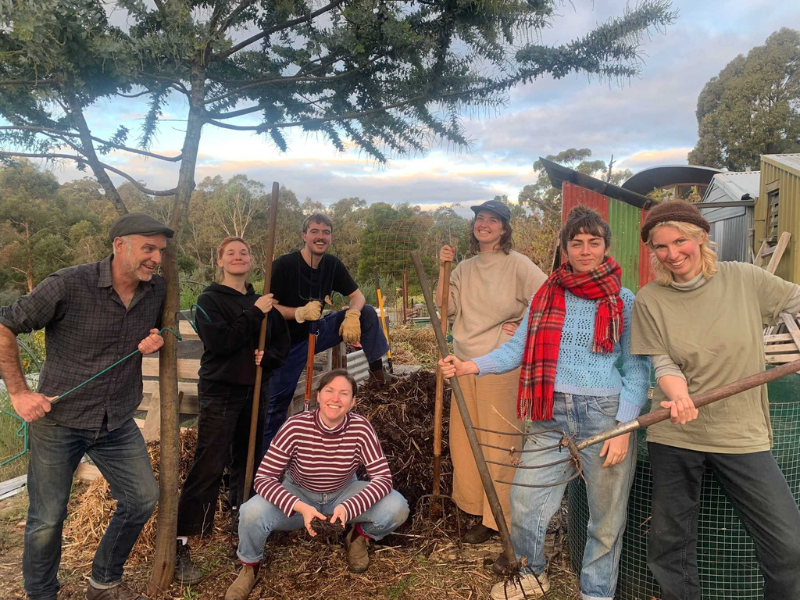
Since 2003, ANZ has partnered with the Foundation for Rural & Regional Renewal (FRRR) to fund more than 850 community groups through the program, with a total investment of more than $6 million.
Now in its 22nd year, the ANZ Seeds of Renewal program is again offering a funding pool of $250,000 to community groups in remote, rural and regional locations for projects aligned to four areas:
ANZ Head of Agribusiness, Mark Bennett said: “The ANZ Seeds of Renewal program has been providing grants to communities in rural and regional Australia for more than two decades, many of which find it difficult to access the resources they need to prosper. The program is something we’re really proud of, and each year I look forward to seeing the diverse mix of applicants and projects,” Mr Bennett said.
FRRR CEO, Natalie Egleton, said: “Partnerships, like our long-running one with ANZ, are critical to enhancing the liveability and vibrancy of remote, rural and regional communities. These grants allow local not-for-profits to get support for initiatives that address the local priorities that communities have identified. I look forward to seeing what projects come through this year,” Ms Egleton said.
Last year, ANZ and FRRR provided grants to 20 community groups for projects including increasing rainforest regeneration, restoring Indigenous plants, enhancing local housing and employment opportunities, and improving financial literacy and money management skills against digital fraud.
Applications for the 2024 Seeds of Renewal program open on 3 July, and close at 5pm (AEST), 1 August 2024.
Interested community groups are invited to join a grantseeker webinar on Tuesday, 9 July at 12.30pm AEST. Register online.
Watch the ANZ Seeds of Renewal 20 year video.
In 2013, a group of like-minded and passionate home economics teachers in Western Australia got together to create an organisation focused on training and assisting young people to develop career pathways in the education, food and hospitality industries.
The group, called Live To Tell Your Story Inc (LTTYS), runs an annual program called Prepare Produce Provide Djinda Ngardak. This culinary program first launched in 2017 and offers First Nations youth (aged 15-17 years) the opportunity to attend a life-changing, week-long camp that shines a light on First Nations culture and connection to land and food. Attendees from across WA are trained and mentored by some of WA’s top chefs. The program celebrates culture, food and storytelling, as well as developing skills primarily linked to employment pathways.
LTTYS received a $10,000 Strengthening Rural Communities Grant to assist in delivering a revised version of Djinda Ngardak alongside the 2023 Desert Dust Up. This annual event brings together eight schools from the Ngaanyatjarra Lands in the Goldfields-Esperance region of Western Australia for three days of activities.
The theme for the program was “Let’s Power-up for Dust Up”. In adapting to the requirements of Desert Dust Up, LTTYS worked closely with the Ngaanyatjarra Lands Schools leadership team, staff and cultural leaders to prepare nutritional meals, access local food sources and create a culturally responsive ‘food skills’ development program to complement both the social and educative aims of Desert Dust Up. The model combines traditional cooking practices with contemporary recipes and styles.
Over 17 days, the Prepare Produce Provide Djinda Ngardak team delivered workshops at seven campuses across Ngganyatjarra lands. Students and staff were active participants and there was a noticeable increase in school attendance as their trip progressed. The workshops were guided by Indigenous Elders and chefs using gathered bush ingredients and provided an insight into ancestral culinary heritage. Evening sessions were also held to support and educate teachers in the delivery of food-related workshops that they could incorporate in their classroom teaching. Additional community members, including police, nurses, Elders and rangers, also participated in the delivery of the workshops.
In addition to teaching the basics of food hygiene and nutrition, and being mentored by industry professionals, the culinary workshops delivered a range of other soft, transferrable skills, as well as sharing and exchanging cultural knowledge, skills and traditional practices, storytelling and enhancing culinary skills.
The program culminated in the delivery of healthy lunchboxes for participants at the 2023 Dust Up. Across the three days of events, more than 4,000 pieces of food were cooked and served to over 350 guests in the local and wider communities. The meals reflected learnings and the work achieved from the workshops on the Lands.
While the 2023 Djinda Ngardak Dust Up program was deemed an outstanding success, it certainly wasn’t without its challenges such as shifting timelines, changing numbers for catering and food supplies either missing or simply not available.
Catherine MacDougall, founder of LTTYS, said that the support from FRRR has provided an opportunity to build networks with additional community members that will be called upon for 2024 Dust Up.
“Relationships are key to the sustainability and growth of the program. FRRR has provided support funds to enhance the Dust Up program, originally developed to address the large issue of food insecurity in remote regions of Western Australia. Dust Up is now a significant program for the LTTYS organisation. It reflects the passion and dedication of our team.”
The wetlands leading to the Kiewa and Murray Rivers will soon be healthier, thanks to Parklands Albury Wodonga’s ‘Restoring Bonegilla’s blue carbon sink wetlands and waterways’ project.
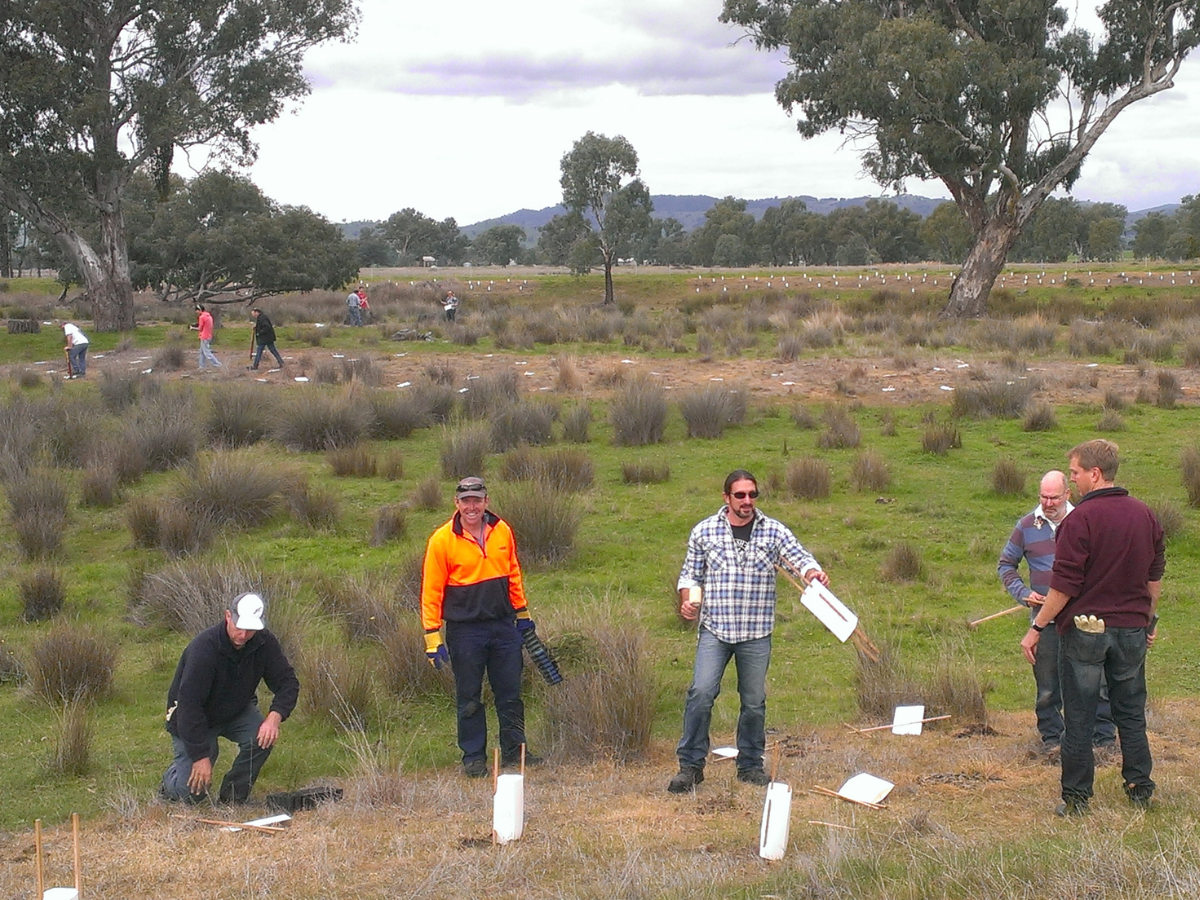
The restoration of wetland plants in floodplain channels and wetlands on these floodplains will capture carbon, slow water runoff and clean the water before it enters major waterways. This will improve water quality, while the restoration of these wetlands will close gaps in current native vegetation corridors, enabling native animals to travel and thereby adapt to the changing climate. The vegetation will also take up atmospheric carbon dioxide, storing it in biomass and sediments.
The project is aligned to decarbonisation and climate adaptation, with strong evidence of community-led development and strong engagement with local Indigenous Elders, disability services and volunteers at the Native Garden Nursery that the group operates.
Since 1997, with the support of more than 3,000 people each year, PAW has been restoring lands degraded by grazing and, more recently a housing development, improving and maintaining the network of bush parks connecting urban and rural communities in the border regions.
A volunteer Committee of Management works closely with the ranger staff to plan and implement rehabilitation, restoration and enhancement of bushlands and parkways for environmental management and recreation.
Volunteers at the nursery have been propagating suitable wetland species from hotter, drier places, which will mean biodiversity resilience as they are planting for a future hotter, drier climate. This well-planned adaptation and restoration project, which received a $16,060 a Community Led Climate Solutions grant, will deliver decarbonisation outcomes and engage the community in planting and developing skills and knowledge for climate solutions activity.
Following the February 2022 floods and the devastation experienced by community members within and surrounding Kin Kin, in southern Queensland, the Kin Kin Community Group (KKCG) shifted its focus towards future planning and the inevitable impacts of another natural disaster on their community. They aim to be better prepared with improved emergency systems to enable their people to operate more efficiently and effectively.
Kin Kin is a secluded southern Queensland hinterland community situated in the Noosa Council area, near its boundary with the Gympie Council. The town has very limited essential services, with only a single general store and café. The February 2022 floods took the town by surprise and left the community fending for themselves. There was no community-friendly meeting place or emergency response centre and the community was cut off by floodwaters for days. No one could enter or leave except by a helicopter from the oval. Food supplies depleted rapidly and communication was hampered, leaving the community in the dark about the ongoing situation. For four days there was limited telecommunication, making the community members feel even more isolated.
KKCG is dedicated to representing and promoting the Kin Kin community, and it was to this organisation that the community turned during their time of distress. The Group operates on behalf of the community, seeking opportunities, positive change and growth for its people. The volunteers are doing all that they can to ensure the community is prepared and supported for the future.
The effects of the 2022 flood events underscored the need for an Emergency Response hub, a place where volunteers and community can gather, to connect, communicate and plan together. The situation also highlighted the scarcity of resources available to support volunteers, including drinking water and first aid equipment. It emphasised the community’s risk areas and disadvantages, illustrating the need for better preparedness in the future.
Fortunately, the KKCG received a grant of $25,000 from the Rebuilding Futures program, funded by the Suncorp Group. This enabled the KKCG to purchase equipment and carry out activities to enhance the community’s safety, connection, resilience and wellbeing. This includes establishing a community hub that is publicly accessible at all times, including during natural disasters, and serves to provide comfort, connection, safety and distribution of essential resources within the community.
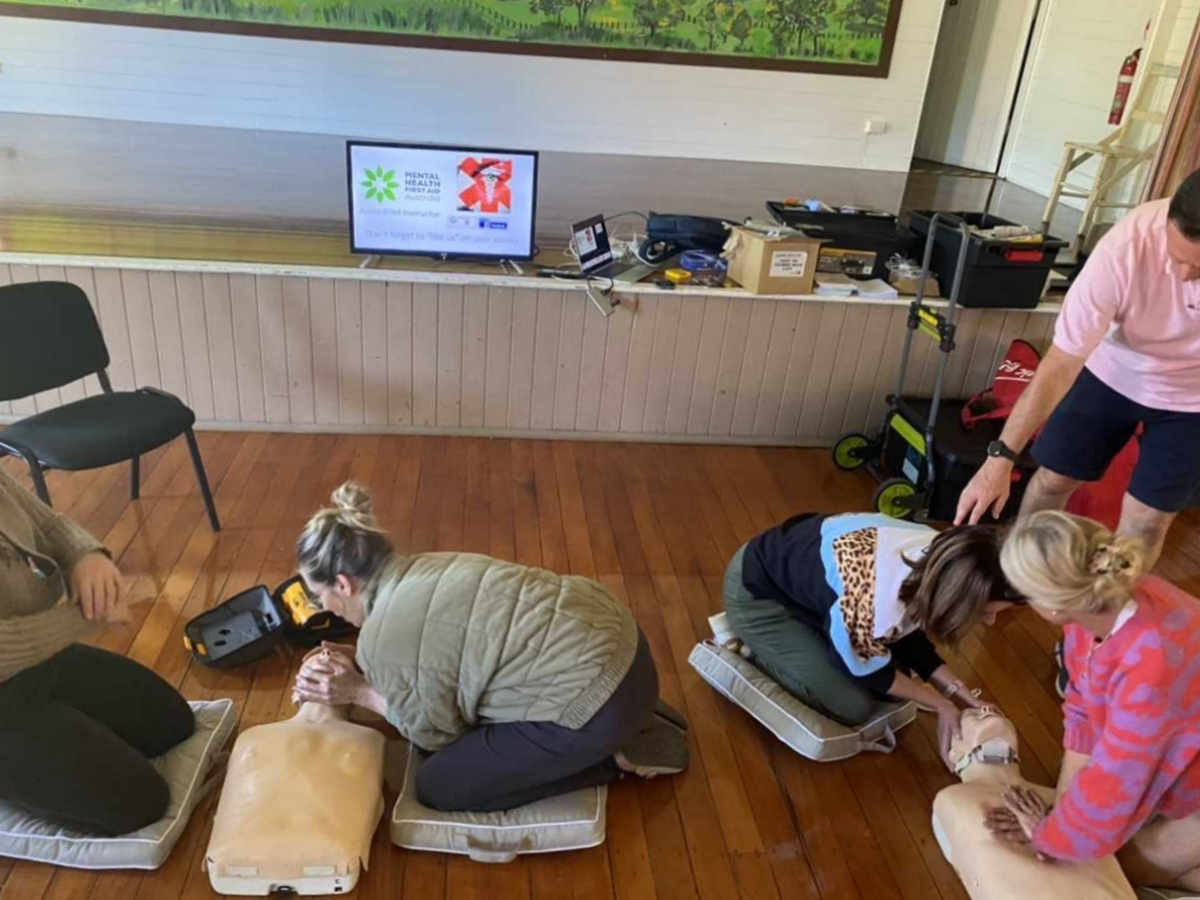
Specifically, the funds went toward essential office equipment such as computers, phones, an air conditioner, a printer, WiFi, first aid kit, a defibrillator, an emergency water supply and a community noticeboard. These resources aid in improving communication and growth within the community. The notice board displays disaster information and preparedness material from the Council and the Queensland Government, designed to better inform the community about disaster preparedness strategies. Furniture was also purchased, to make the space usable for community workshops and events that foster wellbeing and community connection. A recent example of such an event was a free first aid training day hosted by the KKCG. This workshop equipped volunteers with the skills to use the new first aid equipment and defibrillator in case of an emergency.
To combat volunteer fatigue and acknowledge the efforts of the Kin Kin volunteers, a ‘Volunteer Care Program’ was established. This program involves a monthly wellbeing initiative, allowing volunteers and community members to come together and connect. It bolsters the resilience and spirit of the community, fostering a sense of belonging and readiness to support others in times of need. The Community Hub is now equipped to meet the needs of the community in times of distress, with essential community resources and communication strategies focussed on supporting the overall health and wellbeing of the community. The hub, and volunteers who dedicate their time there, ensure that the local people, environment, culture and celebrations are embraced, fostering goodwill and prosperity. Indeed, it is the people and volunteers who have made Kin Kin an even more appealing and positive place to live.
Nestled beside the Rocky River and amid the undulating hills of the Southern Flinders Ranges in South Australia, Laura is a lively, artistic rural community with around 720 residents. The Laura Fair, inaugurated in 1980 to foster art and culture in the region, has been held without interruption until the COVID years.
The Fair is a major highlight for the region and normally taking place over two days at the beginning of April, typically attracting 10,000 to 15,000 patrons. The event is entirely driven by a small volunteer committee and a large contingent of casual volunteers who assist with various aspects of the event.
The event significantly benefits local businesses economically and serves as a primary fundraising platform for numerous local community groups. This family-oriented fair offers a delightful rural experience with great food and coffee, artisan market stalls, entertainment and more throughout the weekend.
To decrease the event costs of hiring equipment, including chairs, the fair committee was supported through a $4,590 Rebuilding Regional Communities grant to buy 200 stackable outdoor chairs for use at the fair and other community events, beginning with the 2024 Fair, which aimed to foster community connections post-pandemic and reinvigorate the event.
The Fair took place 13-14 April and attendees enjoyed a Street Parade, vintage cars, SES, CFS and local business floats and live entertainment, as well as roving performers and buskers, Sideshow Alley, food stalls, an Art Gallery exhibition and more than100 market stalls.
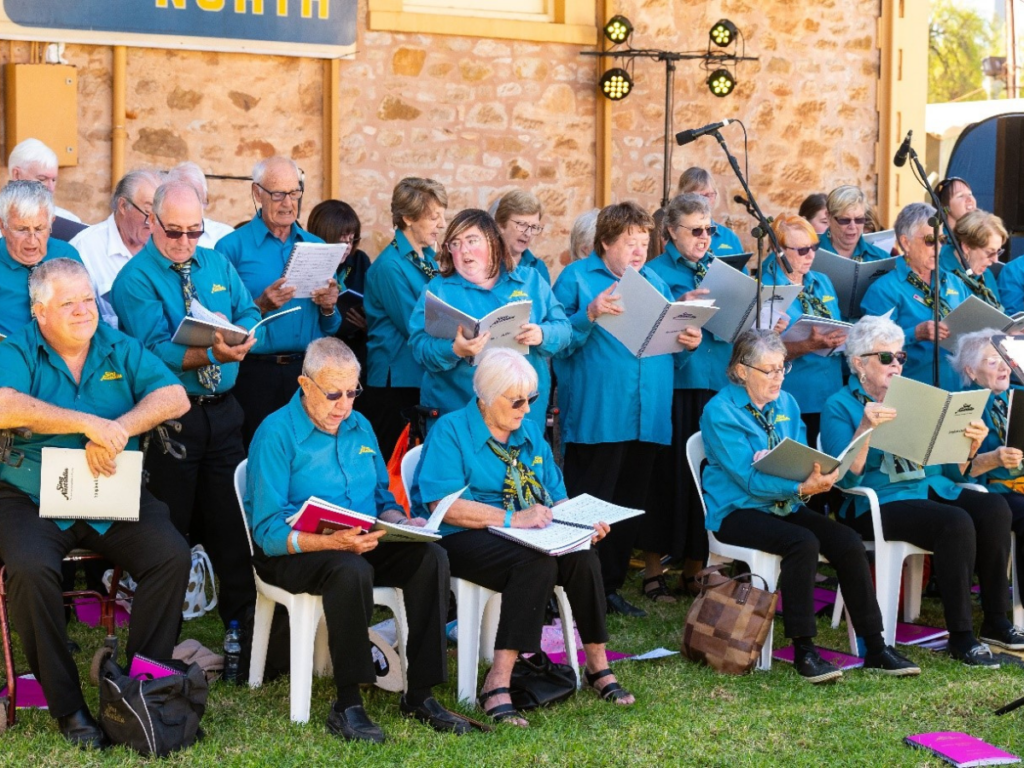
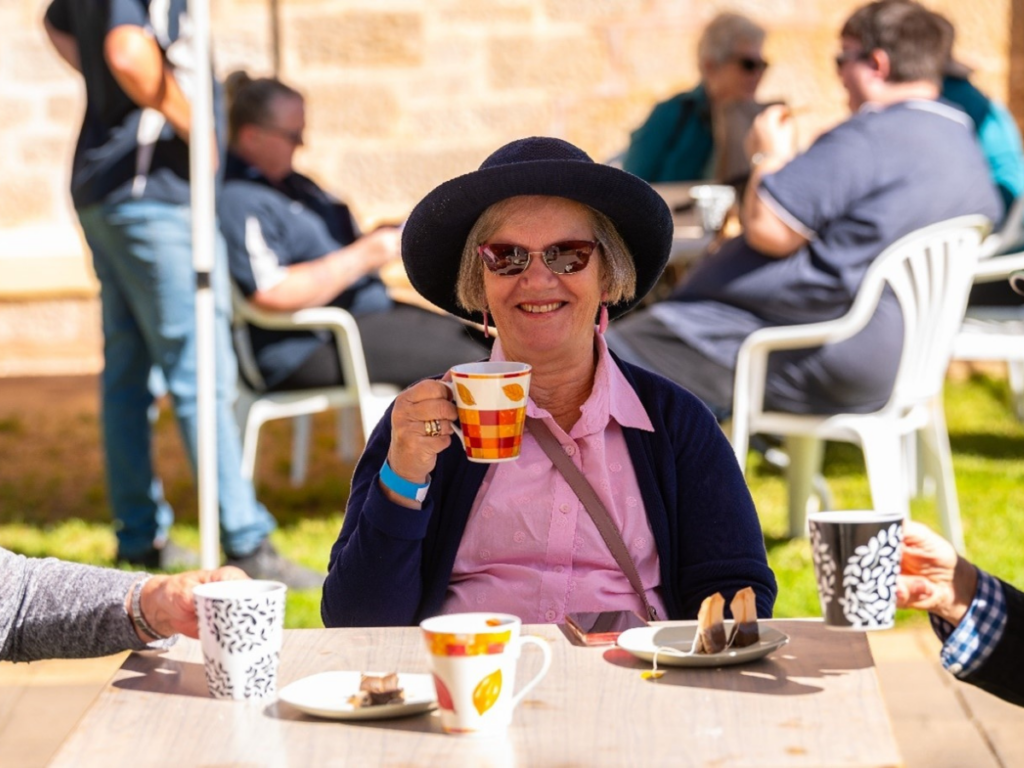
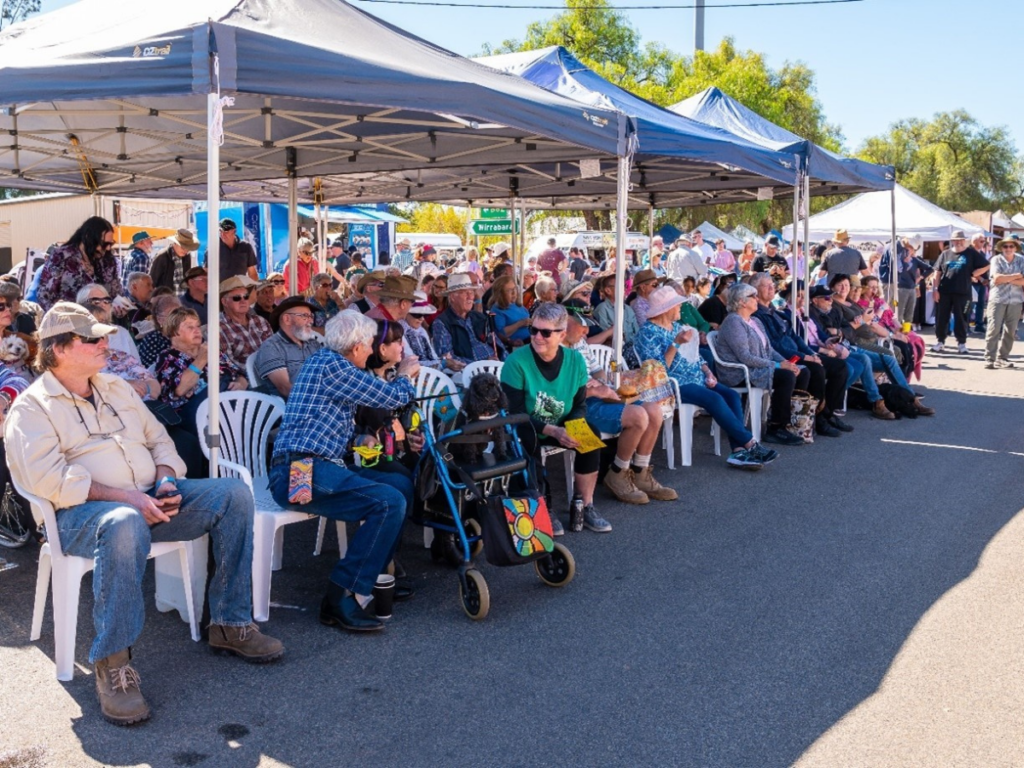
Events such as the Laura Fair are allowing regional, rural, and remote communities to heal and reconnect after the uncertainty and disconnection caused by COVID impacts and are vital to the social and mental recovery of residents.
The chairs purchased with the funds provided by the RRC program will mainly serve the Laura Fair during their yearly event, eliminating the recurring cost of renting them, as the group estimates the money they have spent over the years would have paid for chairs several times over.
The group has storage space in an existing facility to keep and maintain the seats in good condition. With COVID affecting revenue, this cost-saving measure will allow the group to allocate more funds towards running costs or supporting other local community groups. Additionally, these chairs will be available to other community organisations in the Laura area to eliminate the need for them to pay equipment hire.
Funding to meet the local needs and connect communities
One hundred and twenty-nine community groups across remote, rural and regional Australia are sharing nearly $1.4 million in grants through FRRR’s flagship Strengthening Rural Communities (SRC) program.
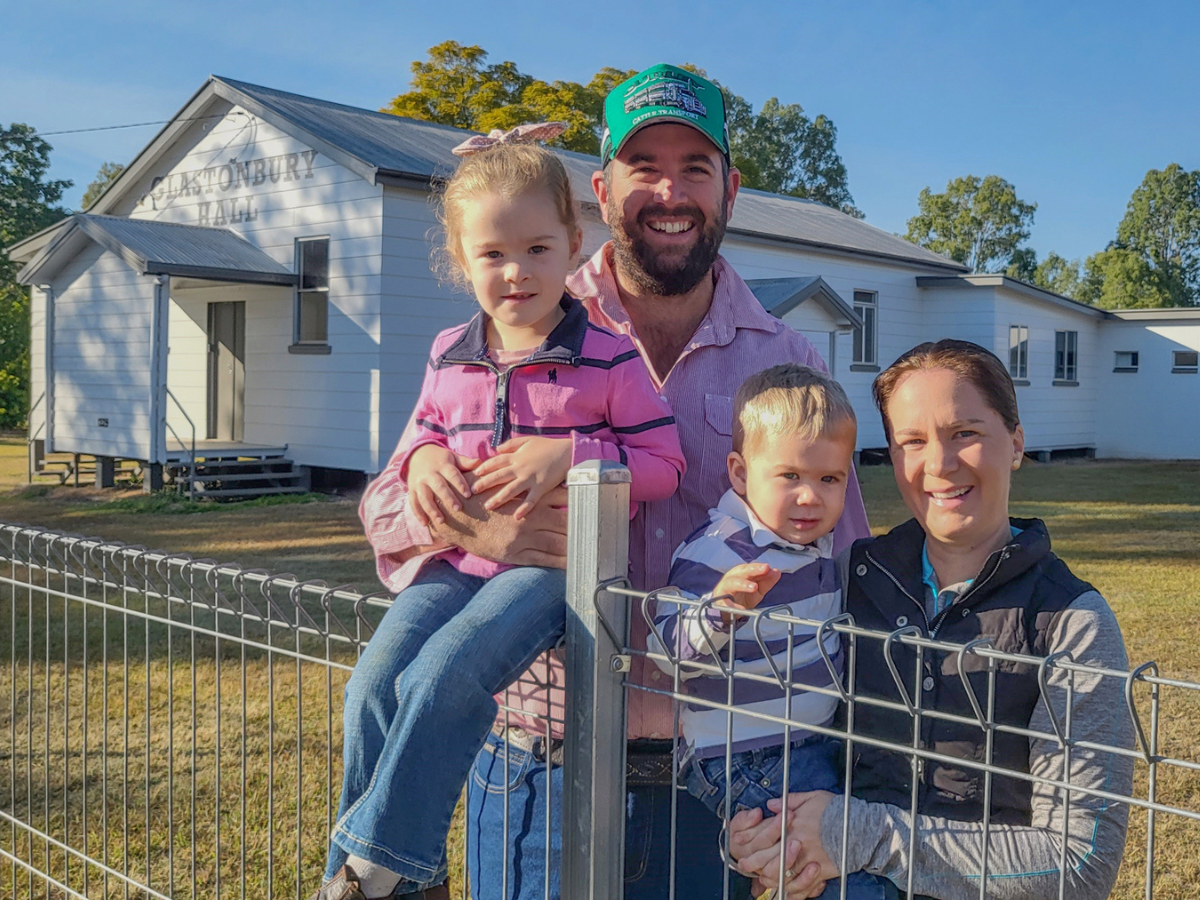
Awarded via three streams of funding, SRC grants support small and vital projects, like upgrades to the community pool in Cummins, SA; COVID recovery projects, such as creating an arts and cultural precinct in the remote community of Tully, QLD; and disaster preparedness or recovery initiatives, like providing culturally informed, trauma-responsive community healing days for the flood-affected community of Lismore, NSW.
FRRR received a record 450 applications for this round of SRC funding, requesting more than $4.5 million in grants for projects valued at more than $19 million. The team has worked hard to shorten the time between applying and awarding SRC grants, with these grants being awarded just nine weeks after the round closed.
Jill Karena, FRRR’s Place Portfolio Lead, says that there is an increasing need for FRRR to fill gaps in areas that may have previously relied on funding from government incentives or programs or support from local businesses.
“The SRC program is flexible and open year-round, meaning it can lean in when Government and other agencies lean out. This access to continued funding opportunities is especially vital in communities that are moving beyond the immediate threats and response to natural disasters and other shocks.
“This round, we have seen increased applications from the organisers of community events, such as local agricultural shows, as some local governments are reducing their annual funding support. We also saw increased funding requests from smaller more remote communities that are a seeking to boost the local economy by developing activities and events to encourage overnight stays from visitors who would otherwise pass through. We also noticed an increase in applications from fringe metro areas and inner rural communities, which seems to indicate that they too are facing diminishing funding opportunities,” she said.
Unmet need continues in small communities
In addition to the 129 initiatives awarded grants, there were a further 85 funding-ready projects, requesting more than $900,000, that FRRR did not have the funds to support. This highlights the importance of small grants to remote, rural and regional community groups and is why FRRR is seeking new partners so that the Foundation can fund more projects in the future.
“Given the uncertainty of the current financial landscape, groups have told us that they value having access to timely secured funding to support medium to long term goals, as well as initiatives that respond to present needs and priorities.
“These are the projects that create a sense of place and identity, and the people and organisations that make these inspiring projects happen need our support. SRC grants provide leverage as they demonstrate to other funders that the projects have value and are supported. But to be able to fund more of them, we need to bring in additional collaborative funders. So we invite all those who want to see a thriving remote, rural and regional Australia to join us to support local initiatives. They really do make a difference,” Ms Karena said.
The SRC program is collaboratively supported by donors, ranging from private individuals to larger foundations, who are acknowledged on the SRC program page.
FRRR always accepts applications to this program, which awards funds around four times a year. Local not-for-profit organisations and community groups are encouraged to review the program guidelines and apply. More information about the SRC program is available at www.frrr.org.au/src.
The full list of grant recipients and their projects are below.
| Organisation | Project | Location | Grant | |||
|---|---|---|---|---|---|---|
| SRC Round 20 - April 2024 | ||||||
| NEW SOUTH WALES | ||||||
| Small & Vital | ||||||
| Arthur Butler Aviation Museum | ABAM Management Plan Create a management plan for the aerodrome to develop future facilities, enhancing Tooraweenah's appeal as a destination and boosting tourism. | Tooraweenah | $5,000 | |||
| Colly Gamilaraay Indigenous Corporation | Collarenebri Community Cultural Festival Celebrate traditional and contemporary Aboriginal culture from across the region through a one-day multi-arts and sporting festival addressing cultural isolation. | Collarenebri | $9,500 | |||
| Connecting With Bricks Inc | Mobile LEGO® Brick Pits Expand organisational capacity and provide equal access to educational and social enrichment tools with mobile Lego brick-building pits for hire by rural schools, libraries, and community groups. | Tintinhull | $10,000 | |||
| Parkes & District Historical Society Inc | Wiradjuri Cultural Storage Facility and Workspace Create an engaging space to learn about Parkes' historical and cultural stories by purchasing a shipping container to showcase the extensive Wiradjuri artefact collection. | Parkes | $10,000 | |||
| Southern Youth and Family Services Limited | Laptops for Learners - Cooma Enable disadvantaged homeless high school students in the Cooma area to fully participate in their school education by providing laptops to complete their studies. | Cooma | $10,000 | |||
| The Trustee for The Salvation Army (NSW) Property Trust | Salvos Community Connect - Engagement Space Boost community connection by purchasing safe, accessible chairs for morning tea gatherings that engage isolated or lonely residents. | Goulburn | $5,000 | |||
| Warren Chamber Music Festival Incorporated | Singing Your Stories | Collie | $10,000 | |||
| Prepare & Recover - 2019/2020 Bushfire Recovery | ||||||
| Mann River Men's Shed Inc | Mann River Shed Electrical System Support bushfire recovery by installing electricity in the workshop building to make it fit for purpose as a Men's Shed, a community meeting space and shelter for future disasters. | Diehard | $25,000 | |||
| Playability Incorporated | Creating an Inclusive Children's Playground Contribute to bushfire recovery by upgrading outdoor facilities to create an abilities and culturally inclusive children’s playground. | Eden | $9,000 | |||
| ADRA Wauchope Community Connect led by ADRA Wauchope Community Connect Adventist Development and Relief Agency Australia Ltd | ADRA Wauchope Community Connect Support bushfire recovery by purchasing a food trailer to continue delivering a food service to vulnerable local residents. | Wauchope | $25,000 | |||
| Courabyra Public Hall Land Manager | Courabyra Hall Storage Infrastructure Contribute to bushfire preparedness and increase capacity to serve as a central resource hub by building new storage areas for food, perishables, and additional safety equipment. | Courabyra | $20,237 | |||
| Friends of Tenterfield Aerodrome Inc | Tenterfield Aerodrome Disaster Resilience Project Enhance bushfire preparedness by constructing a shed to store aerodrome maintenance and firefighting equipment. | Tenterfield | $10,000 | |||
| Nambucca Valley Radio led by Nambucca Valley Radio Radio Nambucca Inc | Tewinga Community Centre Disaster Preparedness Project Enhance bushfire preparedness by purchasing essential disaster equipment and providing emergency training for volunteers and the community. | Tewinga | $16,615 | |||
| Narooma Oyster Festival Limited | Feasibility, Best Practice, Economic Impact Study and Business Case Proposal Enhance organisational capacity in a bushfire-impacted community by engaging industry experts to research and advise on a sustainable self-funding business model for Farmgate and Shellor Door Oyster education and tasting centre. | Narooma | $25,000 | |||
| Narooma Surf Life Saving Club Inc | Video and Audio Conferencing System Enhance bushfire recovery and improve communication during emergencies with a new by video and audio conference system at Narooma Surf Life Saving Club. | Narooma | $1,500 | |||
| Social Justice Advocates of the Sapphire Coast Incorporated | Social Justice Advocates Youth Convenor: A Dedicated Mission Engage a young person to lead workshops and collaboration with diverse young people to build on the youth-focussed bushfire recovery work to address other local l social justice issues | Bega Valley | $24,309 | |||
| Southcoast Health and Sustainability Alliance | Heatwave and Wood Smoke Haven Anglican Church Batemans Bay: Stage 2 Enhance bushfire preparedness by installing hybrid solar technology, ensuring continuous power during grid outages for the building to operate as a bushfire and extreme weather refuge. | Batemans Bay | $24,952 | |||
| Surf Life Saving Lower North Coast Branch Incorporated | 4WD to Maximise Emergency and Disaster Response Capability Contribute to bushfire preparedness and recovery by purchasing a 4WD vehicle for the Surf Life Saving Lower North Coast Branch to maximise emergency and disaster response capability. | Taree, Hallidays Point | $25,000 | |||
| Tabulam Public Hall Reserve Land Manager | Laptop and Printer Acquisition Streamline evacuation centre operations during disasters with a new laptop and printer. | Tabulam | $1,995 | |||
| The Valley Centre for Environmental Education and Research Incorporated | Heart & Humility - Supporting the Creation of a Cultural Fire Hub Facilitate two workshops to establish a community-driven cultural fire hub, promoting cultural burning, and emphasising knowledge transfer and leadership roles for Elders. | Singleton | $10,000 | |||
| Prepare & Recover - 2022 Flood Recovery | ||||||
| Backtrack Works Ltd | Disaster Recovery Response Crews Boost flood recovery and preparedness by upskilling young people as a fast response resource in times of natural disaster. | Tenterfield | $25,000 | |||
| Ettrick Hall Committee Incorporated | The Safe Hub Boost flood preparedness by purchasing a generator for the Safe Hub. | Ettrick | $1,810 | |||
| Hillston Creative Arts Council Incorporated | Red Dust and Paddy Melons Community Gallery Re-stumping and stabilisation project Support repairs to a community-owned heritage gallery and information centre damaged by severe weather and floods. | Hillston | $25,000 | |||
| Northern Rivers Community Healing Hub | Healing Hub : Wellness Wednesdays Provide culturally informed, trauma-responsive community healing days for flood-affected individuals over seven months in a supportive environment. | Lismore | $25,000 | |||
| Proprietor Bundgeam Pre-School Inc | Bundgeam Prepared and Safe Enhance the existing community disaster safe space by purchasing a defibrillator, upgrading pumps for flood mitigation, and fireproofing the building. | Grevillia | $15,000 | |||
| The Colony Bees Association Inc | Pollinate Country Establish and maintain 30 new beehive nesting sites to restore pollination to native plants and crops affected by recent floods. | Lennox Head | $8,800 | |||
| Tyalgum District Community Association Inc | Improving Safety Through Communication Improve communication for flood preparedness and recovery by installing a mobile repeater, linkage repeater and solar charge system. | Tyalgum | $22,605 | |||
| Rebuilding Regional Communities - Micro | ||||||
| Big Brothers - Big Sisters Australia Limited | Big Brothers Big Sisters Tumut Address isolation, loneliness and disengagement of young people after the pandemic through training 10 new volunteer mentors for the Tumut Big Brothers Big Sisters program. | Tumut | $10,000 | |||
| Community Resources Limited | Helping Hands – Community Outreach Project Ameliorate post-pandemic isolation experienced by seniors by employing a short-term coordinator and two staff members to facilitate a welfare and education outreach program. | Forster | $8,328 | |||
| Coonamble Golf Club Ltd | Little Links: A Playful Oasis at Coonamble Golf Club Enhance social cohesion and provide a safe and family-friendly place to gather in a remote region post-COVID-19 through the construction of a playground at a community hub. | Coonamble | $9,928 | |||
| Edward River Art Society Incoporated | Riverbend Gallery Encourage visitation and boost community engagement with visual arts and culture post-pandemic with marketing support for exhibitions and events at a community gallery. | Deniliquin | $8,750 | |||
| Eurobodalla Chamber Orchestra | Enhancing Public Performance Enhance the post-pandemic capacity of a chamber orchestra to perform at outdoor venues through the purchase of robust music stands and sheet music covers. | Batemans Bay | $2,748 | |||
| Fungi Feastival Association Incorporated | Fungi Feastival 2024 Unite diverse sectors of the community, reduce social isolation, and encourage tourism post-pandemic through the hosting of the expanded Fungi Feastival with expert guest speakers. | Batemans Bay | $8,000 | |||
| Grafton Community Shed Incorporated | Machinery Upgrade Increase organisational capacity, reduce social isolation and encourage new membership of a community shed by purchasing new woodworking and metalworking equipment. | Grafton | $5,000 | |||
| Hope Bathurst Incorporated | HopeCare Community Garden Expansion Build organisational capacity of a community garden and improve access to fresh food post-COVID-19 through establishing new fruit trees and raised garden beds. | Bathurst | $9,732 | |||
| Lions Club of Boorowa Inc | New Storage Shed - Stage 1 Support the operation of an increasingly busy, volunteer-run driver reviver van by laying a concrete slab for the van storage shed. | Boorowa | $8,440 | |||
| Molong Historical Society Incorporated | Upgrade of Artefacts Storage Facility Encourage visitation post-pandemic through upgrading an artefact storage facility to effectively house museum exhibits and allow the acquisition of further items. | Molong | $10,000 | |||
| Moree Plains Shire Council | Fanny Lumsden's Country Hall's Tour Enhance community morale and recovery post-pandemic and inspire local musicians by facilitating the visit of Fanny Lumsden’s Country Halls Tour to a small remote community. | Garah | $3,000 | |||
| Nimbin Health & Welfare Assoc Inc | Nimbin Mental Wealth Expo '24 Increase awareness of mental health services and enhance wellbeing post-pandemic through hosting an inclusive interagency Mental Wealth Expo. | Nimbin | $7,200 | |||
| RiverSmart Australia Limited | A Better Path to WOW Relaunch Increase tourism and the safety of post-pandemic visitors by building a concrete coach-disembarking point and accessible pathway. | Warren | $10,000 | |||
| Skillset Limited | Career Connections Pilot a workplace learning program by connecting year 10 students with businesses for work placement opportunities addressing barriers faced by disadvantaged students post-pandemic. | Bathurst | $9,992 | |||
| Tamworth Regional Craft Centre Incorporation | Tamworth Regional Craft Centre Incorporation (TRCCI) Accessibility ramp to club house Build an accessible and compliant ramp to encourage increased participation in activities at a community arts centre. | Tamworth | $9,000 | |||
| The Rotary Club of Uralla Incorporated | Bundarra Garden Festival Enhance community reconnection, tourism, and economic recovery post-pandemic through promoting and creating signage for a garden festival. | Bundarra | $4,000 | |||
| Tumbarumba Men's Shed Inc | Spindle Moulder Purchase install and commission fit-for-purpose woodworking equipment to enhance a the Men’s Shed ability to safely recycle bushfire-recovered and salvaged timber for use in community projects after COVID-19. | Tumbarumba | $3,446 | |||
| NORTHERN TERRITORY | ||||||
| Small & Vital | ||||||
| Marrakai Volunteer Bushfire Brigade Incorporated | Enhancing Prescribed Burn Capabilities: ATV Buggy Acquisition Project Purchase a specialised all-terrain vehicle to support volunteers to increase the number and safety of prescribed burns to protect the community. | Marrakai | $10,000 | |||
| The Trustee for Karrkad-Kanjdji Trust | Warddeken and Walaaybaa Ranger Exchange Enhance community capacity for cultural and environmental preservation by sharing knowledge across Indigenous Ranger groups through a ranger exchange. | Mamardawerre | $40,500 | |||
| Rebuilding Regional Communities - Micro | ||||||
| Enterprise Learning Projects | Impact North Cowork Upgrades for Community Events Support remote Indigenous entrepreneurs and organisations to connect and learn post-pandemic by purchasing outdoor furniture, equipment, and signage to establish a culturally appropriate events and meeting space. | Darwin | $9,693 | |||
| QUEENSLAND | ||||||
| Small & Vital | ||||||
| Burdekin Woodcrafts Association Incorporated | Provide Additional Storage Area for Burdekin Woodcrafters Support the purchase and fit out of a storage facility for donated wood, increasing the groups’ capacity to support community initiatives and reducing environmental waste. | Ayr | $9,450 | |||
| Clermont Kindergarten Day Care Centre Association Incorporated | Kindy Gym / Obstacle Course Project Provide outdoor play facilities for preschool children, supporting the development of physical skills, coordination, and balance. | Clermont | $10,000 | |||
| Etheridge Cares Inc | Mowers to Maintain Yards for Seniors Purchase mowing equipment to provide at-home mowing services for elderly residents, supporting them to live independently in the community. | Georgetown | $9,426 | |||
| Isisford Primary P&C Association | Dancing Lessons in the Dirt and Dust Foster community connection by providing after-school dance lessons for children in an isolated community, culminating in a public performance. | Isisford | $6,000 | |||
| Millmerran Academy of Performing Arts Inc | What's the MAPA Support a series of creative arts workshops and events to foster youth engagement with the arts, improving social outcomes and youth resilience. | Millmerran | $10,000 | |||
| Peak Crossing Public Hall Association Incorporated | Perimeter Fence Around Peak Crossing Public Hall Install a perimeter fence around a public hall to create a safe and welcoming space that will facilitate increased community use. | Peak Crossing | $10,000 | |||
| QCWA Branch Jackson | Back Yard Blitz Undertake landscaping works to improve safety and amenity of a local CWA hall, ensuring the community has access to a comfortable and safe gathering space. | Jackson | $9,900 | |||
| Returned & Services League of Australia (Queensland Branch) Gin Gin Sub-Branch Inc | New Fridge for Gin Gin RSL Sub Branch Replace worn out and inefficient fridge at the local RSL to ensure the safe storage of food for social events and activities that connect elderly residents. | Gin Gin | $2,750 | |||
| Returned & Services League of Australia (Queensland Branch) Wondai Sub-Branch Inc | Maintaining Wondai RSL Sub Branch Memorial Park Purchase a ride-on mower to enable older volunteers to maintain a local memorial park that Council has handed over to the group to manage for community use. | Wondai | $9,000 | |||
| Prepare & Recover - 2022 Flood Recovery | ||||||
| Wujal Wujal Aboriginal Council | Wujal Wujal Prepare and Recover Project Build preparedness for future climate related disasters in a community impacted by Cyclone Jasper by purchasing emergency generators, lighting, portable cooking equipment and swags. | Wujal Wujal | $25,000 | |||
| Rebuilding Regional Communities - Micro | ||||||
| Artworks Granite Belt Inc | Upgrade of Facility Boost the capacity of a volunteer-run community cafe to provide training and employment opportunities post-pandemic by upgrading commercial kitchen equipment. | Stanthorpe | $8,437 | |||
| Babinda Community Kindergarten Inc | Meeting Place Reduce social isolation post COVID-19 by creating an inclusive outdoor community meeting space protected from the elements by a gazebo. | Babinda | $10,000 | |||
| Mt Perry Show Society Inc | Mt Perry Showgrounds Maintenance and Upkeep Support the post COVID-19 development of a site for community events and a new caravan park by purchasing a ride-on lawn mower. | Mount Perry | $10,000 | |||
| Noorama Sports and Recreation Centre Inc | Kitchen Renovations Reduce social isolation in a very remote community post-COVID 19 by upgrading kitchen facilities at their only community hub. | Noorama | $10,000 | |||
| Rathdowney and District Memorial Grounds Association Incorporated | Telehealth Room Provide discreet access to vital healthcare and social-support services post-pandemic by creating a private, dedicated telehealth room at a community hub in an isolated regional area. | Rathdowney | $10,000 | |||
| Ravenshoe Community Centre Inc | Ravenshoe Community Garden Strengthen social connection, provide access to fresh food, and sustain the work of volunteers at a community garden after the pandemic through the purchase of a trailer and improved garden soil. | Ravenshoe | $6,000 | |||
| Stella Community | Bowen Community Garden Support the creation of a new inclusive community garden to provide access to fresh food and encourage social cohesion post-pandemic through the purchase of raised garden beds, soil, and garden equipment. | Bowen | $8,000 | |||
| The Hervey Bay Neighbourhood Centre Incorporated | Community Skills Boost Facilitate a low-cost leadership program to support members of community organisations in the social service sector to build skills and capability to address local challenges post-pandemic. | Hervey Bay | $7,850 | |||
| Theodore Early Childhood Centre Association Inc | TECCA Bonanza Project Support community reconnection, economic recovery, and organisational sustainability post-pandemic by holding a family-friendly rodeo event. | Theodore | $9,988 | |||
| Tully Arts and Cultural Precinct led by Tully Arts and Cultural Precinct Tully Support Centre Inc | Tully Arts and Cultural Precinct - Community Consultation and Planning (TACP-CCP) Support the creation of an arts and cultural precinct in a remote community post-COVID-19 by engaging the community in developing a strategic plan. | Tully | $10,000 | |||
| SOUTH AUSTRALIA | ||||||
| Small & Vital | ||||||
| Cummins Memorial Recreation Centre Inc | Cummins and District War Memorial Swimming Pool Redevelopment Support community wellbeing and water safety with upgrades at a remote community pool that offers vital learn-to-swim programs. | Cummins | $10,000 | |||
| Inman Valley Community & Memorial Hall Association Incorporated | Keep Us Cool at the Inman Valley Memorial Hall Increase hall usage by installing a split system to provide a comfortable, safe, and welcoming community meeting space. | Inman Valley | $10,000 | |||
| Mintaro Progress Association Inc | Mintaro Seniors a Connected Community Foster social connections and increase community wellbeing and resilience by providing a series of activities and workshops for older people. | Mintaro | $4,000 | |||
| Rebuilding Regional Communities - Micro | ||||||
| Balaklava Town Hall Management Committee Incorporated | Sound Upgrade Stage 2 Bolster post-pandemic organisational recovery and improve community access to the arts by upgrading audio equipment to provide quality sound at a community theatre and concert venue. | Balaklava | $10,000 | |||
| Carrackalinga Board of Management | Improving Functional Use of Carrickalinga House Senior Citizens Facility Encourage greater use of a community facility and increase safety, hygiene, and accessibility post-pandemic through floor resurfacing and installing a commercial-grade benchtop dishwasher. | Victor Harbor | $10,000 | |||
| Milang and District Community Association Incorporated | Lakeside Butter Factory Cafe & Catering Social Enterprise Boost the capacity of a new social enterprise cafe to provide training and employment opportunities in the community post-pandemic through the purchase of commercial kitchen equipment. | Milang | $9,778 | |||
| Riding for the Disabled Association SA Inc | Revival of Riding for The Disabled on the Yorke Peninsula Support the re-establishment of a Riding for the Disabled group closed due to lack of volunteers post-pandemic through fortnightly transport of horses to provide social and therapeutic activities for those living with disability. | Kadina | $10,000 | |||
| Southern Yorke Peninsula Community Hub Incorporated | Supporting our SYP Community Foster life-long learning, community resilience and cohesion post-COVID-19, through a series of digital literacy workshops and technical assistance for disadvantaged community members. | Yorketown | $10,000 | |||
| TASMANIA | ||||||
| Small & Vital | ||||||
| Brighton Community Food Hub | Expansion Project - Food to Families Enhance the capacity of a growing emergency food relief program by upgrading equipment and covering volunteer travel costs to aid vulnerable residents. | Brighton | $10,000 | |||
| Dignity Supported Community Gardening Inc | DIGnity Gardening Sessions Improve health and wellbeing outcomes through a therapeutic gardening program supporting vulnerable, marginalised and socially isolated community members. | Dodges Ferry | $9,240 | |||
| Freycinet Volunteer Marine Rescue Association Inc | PE-ER: Protective Equipment - Efficient Radio Support community safety and enhance organisational capacity during emergencies by upgrading communication equipment and protective clothing. | Swansea | $9,968 | |||
| Huon Valley Police & Community Youth Club Inc | Community Café Skill development for disengaged and at-risk young people through the establishment of a youth led café at local community centre. | Huonville | $10,000 | |||
| St Helens Marine Rescue Association Incorporated | Marine Rescue Capability Extension Strengthen capability of an emergency service and support the work of volunteers through the upgrade of telecommunication equipment and safety jackets. | St Helens | $7,260 | |||
| Rebuilding Regional Communities - Micro | ||||||
| Folk Federation of Tasmania Incorporated led by Mount Roland Folk Federation | Mount Roland Folk Festival 2024 Increase community engagement post-pandemic by collaborating with the local school, and by offering free and discounted concerts featuring local and emerging artists. | Sheffield | $5,000 | |||
| Mount Roland Land Care Inc | Reconnecting Kentish: Building Organisational Capacity Develop organisational and volunteer capacity post-pandemic via the delivery of first aid, traffic management and mental health training and the purchase of appropriate PPE and tools. | Sheffield | $8,097 | |||
| The Derwent Catchment Project Inc | Hamilton Resource Centre Upgrade Enhance connectivity, boost organisational capacity, and improve a collaborative space post-COVID-19 by installing video conferencing equipment in a community resource centre. | Hamilton | $10,000 | |||
| VICTORIA | ||||||
| Small & Vital | ||||||
| Strzelecki Public Hall Incorporated | Heating for Our Hall Increase the use of the community hall by installing a climate control split system to make the meeting space more comfortable, safe, and welcoming. | Strzelecki | $10,000 | |||
| Ararat Men's Shed Inc | Metal Lathe Improve older men's mental health by purchasing equipment to encourage new members, enhance shed skills and provide a greater community service. | Ararat | $7,800 | |||
| Benalla Health | Benalla Grow Your Own Establish a network of community worm farms to provide compost for a sustainable community food garden supporting vulnerable residents. | Benalla | $10,000 | |||
| Birchip Neighbourhood House Inc | Connecting and Learning: Food, Fun and Fellowship Enhance senior citizens' health and social wellbeing and foster intergenerational connections by hosting 10 monthly community lunches in Birchip. | Birchip | $6,400 | |||
| Friends of Morwell National Park Inc | Feeling Chirpy: A Bird Book for Morwell National Park Enhance community connections, social wellbeing and understanding of local biodiversity by creating a citizen-led, plain-English, local bird guidebook. | Jeeralang Junction | $5,000 | |||
| Maffra Golf Club | Clubroom Renovation Boost opportunities for social connection in a community meeting space by upgrading furniture and re-painting a function room hired for training activities, functions, and events. | Maffra | $10,000 | |||
| Numurkah Community Learning Centre Inc | Growing Community Improve the viability of the community hub’s food garden with new equipment and greenhouse, ensuring year-round produce to provide local access to nutritious food via a food relief pantry. | Numurkah | $8,342 | |||
| Tatura Civic Halls Committee Incorporated | Keep the Power Safe and On Create a safe and compliant space for meetings and activities by upgrading the electrical system at the community owned Tatura Civic Hall Complex. | Tatura | $7,000 | |||
| Tyntyndyer Homestead Incorporated | Ride-on Mower Enhance tourism and cultural awareness of Watti Watti First Nations and colonial history by purchasing a mower to assist volunteers to maintain the visitor precinct grounds. | Beverford | $7,699 | |||
| U3A Colac Otway Incorporated | Filipino Cultural Event Foster opportunities for cross-cultural connection and enhance older people’s social wellbeing through a Victorian Seniors Festival community meal event in Colac. | Colac | $2,500 | |||
| Yarrawonga Mulwala Men's Shed | Future Building Enhance a volunteer program for men's physical and social health by purchasing machinery for workshop expansion and new chairs for meetings and activities. | Yarrawonga | $5,073 | |||
| Yea Agricultural Pastoral and Horticultural Society | New Water Supply Improve access to water for users of the reserve by installing new water outlets, supporting tourism, social connection, and community safety. | Yea | $5,698 | |||
| Prepare & Recover - 2019/2020 Bushfire Recovery | ||||||
| Cabbage Tree Public Hall | Emergency Equipment Shed: Construction and Completion Boost disaster preparedness and bushfire recovery capacity by installing a storage shed for emergency equipment at a public reserve. | Cabbage Tree Creek | $22,694 | |||
| Duduroa Dhargal Aboriginal Corporation | Ryans Lagoon Wetlands – Caring and Reviving Culture and Country Hub Strengthen bushfire preparedness and improve safety by purchasing a ride on mower to maintain scrub and grassland on nationally significant wetlands. | Bonegilla | $25,000 | |||
| Swifts Creek Recreation Reserve Committee of Management | Maintenance of the Swifts Creek Recreation Reserve Enhance disaster readiness and volunteer support in a bushfire-affected shire by purchasing a ride-on mower to maintain a reserve and safeguard a community space. | Swifts Creek | $25,000 | |||
| Warrigunya Aboriginal and Torres Strait Islander Corporation | Maintaining Warrigunya Against Potential Fire Threats Improve disaster preparedness in a bushfire impacted region and support skill development by purchasing a tractor and slasher to maintain grassland. | Darriman | $24,700 | |||
| Prepare & Recover - 2022 Flood Recovery | ||||||
| RFDS Community Transport, Rochester led by RFDS Community Transport, Rochester Royal Flying Doctor Service of Australia (Victorian Section) | Volunteer Engagement and Community Recovery Enhance volunteer support and health outcomes for flood-impacted residents by engaging a program support worker to coordinate medical appointments via the RFDS transport program. | Rochester | $25,000 | |||
| Rebuilding Regional Communities - Micro | ||||||
| Threatened Species Conservancy Inc | Enhancing Mallee Emu-Wren and Mallee Bird Conservation Support community reconnection post-pandemic, by delivering interactive community information sessions on conserving habitats for the Mallee Emu-Wren and other threatened Mallee birds. | Mildura | $10,000 | |||
| Avenel Active | Avenel 'Get Me to the Shops' Community Transport Project Reduce social isolation, increase independence, and enhance wellbeing post-pandemic by providing weekly volunteer-assisted bus shopping trips for residents who are elderly, frail or with restricted mobility. | Avenel | $4,200 | |||
| Beaufort Agricultural Society Inc | Enhance Storage for the Beaufort Show Sustain community events post-COVID-19 and improve participant and volunteer safety by installing roller doors on a storage area and agricultural show livestock shed. | Beaufort | $10,000 | |||
| Bella A'Capella led by Bella A'Capella Echuca-Moama Arts Initiative | Spring Sing Workshop Support post-pandemic creative recovery of Northern Victoria's community choirs, enhancing greater group connection, by facilitating a singing workshop in Echuca. | Echuca | $2,253 | |||
| Gargarro Botanic Garden Ltd | Mower for Gargarro Botanic Garden Improve safety and workload of volunteers’ post-pandemic by purchasing a reliable ride-on mower to maintain grounds and boost visitation of a garden complex in Girgarre. | Girgarre | $10,000 | |||
| Gnarly Neighbours | Social Enterprise Fit-Out Increase opportunities for disadvantaged young people to build skills, knowledge, and connection post-pandemic through a fit-out at a social enterprise to create a skate store, coffee area and chill space. | Seymour | $10,000 | |||
| Hindmarsh Shire Council | Reconnecting Small Communities through Films and Music Enhance reconnection opportunities post-pandemic for seniors with limited capacity for travel through a series of film screenings and concerts being held in their own community. | Dimboola | $10,000 | |||
| Kiewa Valley Community Garden led by Kiewa Valley Community Garden Lions Club of Upper Kiewa Valley Inc | Kiewa Valley Community Garden Inclusive Seating Project Increase opportunities for projects, activities, and social connection post-pandemic by providing durable seating and tables at a community garden hub. | Tangambalanga | $9,754 | |||
| Melville Forest Community Centre Inc | Melville Forest Hall Restoration & Refresh Enhance a community hub through paint, flooring, and air-conditioning upgrades to create a welcoming and financially sustainable venue for events and activities that encourage post-pandemic reconnection. | Melville Forest | $10,000 | |||
| Murtoa’s Big Weekend Event Committee led by Murtoa’s Big Weekend Event Committee Murtoa Events Incorporated | Murtoa - A Land of Wonder Foster social connection tourism and creative COVID-19 recovery by enabling local artists to collaborate with the community to create a lakeside lighting installation for Murtoa’s Big Weekend event. | Murtoa | $10,000 | |||
| RDA - Swan Hill led by RDA - Swan Hill Riding for the Disabled Association of Victoria Inc | Fencing Upgrade Project Boost the capacity of the organisation to provide safe therapeutic equestrian activities post-pandemic through essential fencing upgrades at their site located next to a busy highway. | Swan Hill | $9,304 | |||
| St Mary's Primary School Parents and Friends Association led by St Mary's Primary School Parents and Friends Association Sea Lake | St Mary's Sea Lake Gala Day Encourage community connection and address social and geographical isolation post-pandemic by reviving an inclusive Gala Day, providing entertainment and activities for all ages. | Sea Lake | $7,000 | |||
| Trafalgar Holden Museum Inc | Holden Heritage Centre Display Cabinets Sustain the Holden Heritage Centre and their work post-pandemic, encouraging greater visitation to the area by installing display cabinets to securely exhibit and preserve artefacts. | Trafalgar | $10,000 | |||
| Wangaratta Symphony Orchestra Incorporated | Wangaratta Sounds Under Light - Shining a Light on Regional Music! Promote social connection and support creative recovery post-pandemic by facilitating a unique concert and light show at an iconic local cathedral during the Wangaratta Festival of Jazz and Blues. | Wangaratta | $10,000 | |||
| Wollangarra Inc | A Strong and Trained Volunteer Team Reignite a program at a youth education centre post-COVID-19, boosting organisational capacity through training activities to increase volunteers’ knowledge and skills. | Licola | $10,000 | |||
| WESTERN AUSTRALIA | ||||||
| Small & Vital | ||||||
| Collie Men's Shed Inc | Lean-to and Wood Storage Area Build an all-weather working and wood storage area to enable members to work safely on outdoor projects. | Collie | $10,000 | |||
| Dandaragan Community Centre ManagementCommittee Incorporated | Storage Cupboards for Change Rooms Install storage at local community centre to increase community use and flexibility of the space. | Dandaragan | $10,000 | |||
| Friends of Bibbawarra Bore Aboriginal Corporation | Bibbawarra Bore Reconciliation and Land Care Project Support development of an ecotourism business case for locally led restoration of historic hot springs. | Carnarvon | $10,000 | |||
| Lower Coastal Community Association Inc | Lower Coastal Community Bus Establish an accessible and affordable community bus service in an area without existing public transport. | Guilderton | $5,000 | |||
| Society of Kimberley Indigenous Plants and Animals led by Society of Kimberley Indigenous Plants and Animals Environs Kimberley | Home for SKIPA Support the development of an indigenous plant nursery, enhancing volunteer capacity to rehabilitate local environments. | Broome | $10,000 | |||
| Prepare & Recover - 2022/2023 Cyclone & Flooding Recovery | ||||||
| Marra Worra Worra Aboriginal Corporation | Preparing and Protecting Fitzroy Crossing Enhance disaster preparedness with back-up emergency food supplies for remote communities in a region severely impacted by Cyclone Ellie. | Fitzroy Crossing | $24,500 | |||
| Prepare & Recover - 2021 Cyclone & Flooding Recovery | ||||||
| Kalbarri Men's Shed Inc | Constructing a Community Garden Establish a community garden as part of a new multi-use facility, fostering social connections and community resilience in the recovery from Cyclone Seroja. | Kalbarri | $9,800 | |||
| Rebuilding Regional Communities - Micro | ||||||
| Bridgetown's Grumpy Old Men Inc | Upgrade Dust Extraction System Strengthen organisational capacity to provide safe working conditions and attract new men’s shed members post-pandemic, by purchasing mobile dust extractors for use with woodworking equipment. | Bridgetown | $5,096 | |||
| Great Southern Community Legal Services | Great Southern Community Legal Service Digital Enhancement Project Improve the post-pandemic capacity of a community legal service to provide video-based legal consultations by furnishing three hybrid meeting spaces. | Albany | $8,160 | |||
| Leeman Green Head Community Resource Centre Incorporated | Resilient Roof Restoration: Safeguarding Community Resources Sustain the work of a community resource centre experiencing increased demand for its services post-COVID 19 by undertaking essential roof repairs. | Leeman | $10,000 | |||
| Pemberton Youth Emergency Service Cadets | Pemberton Youth Emergency Services Development Project Boost organisational and volunteer capacity post-pandemic by equipping the Youth Emergency Services cadet program with appropriate PPE and storage equipment. | Manjimup | $10,000 | |||
| Ravensthorpe Wildflower Show Inc | Celebrating Together - Finding Out More Support community reconnection and upskill volunteers post-pandemic by facilitating a native wildflower show opening and holding a series of free community flora identification workshops led by a botanist. | Ravensthorpe | $5,000 | |||
| Shire of Dalwallinu | Dalwallinu Community Celebration Enhance post-pandemic economic and social recovery in a remote community by hosting a community celebration at the culmination of Wattle Week to boost overnight stays and social connections. | Dalwallinu | $9,659 | |||
| Shire of Kondinin | Hyden Railway Barrack Restoration Enhance community spirit and tourism post-COVID-19 by providing interpretive signage to complete the restoration of the town's oldest intact building which has been relocated to a prominent new site. | Hyden | $5,100 | |||
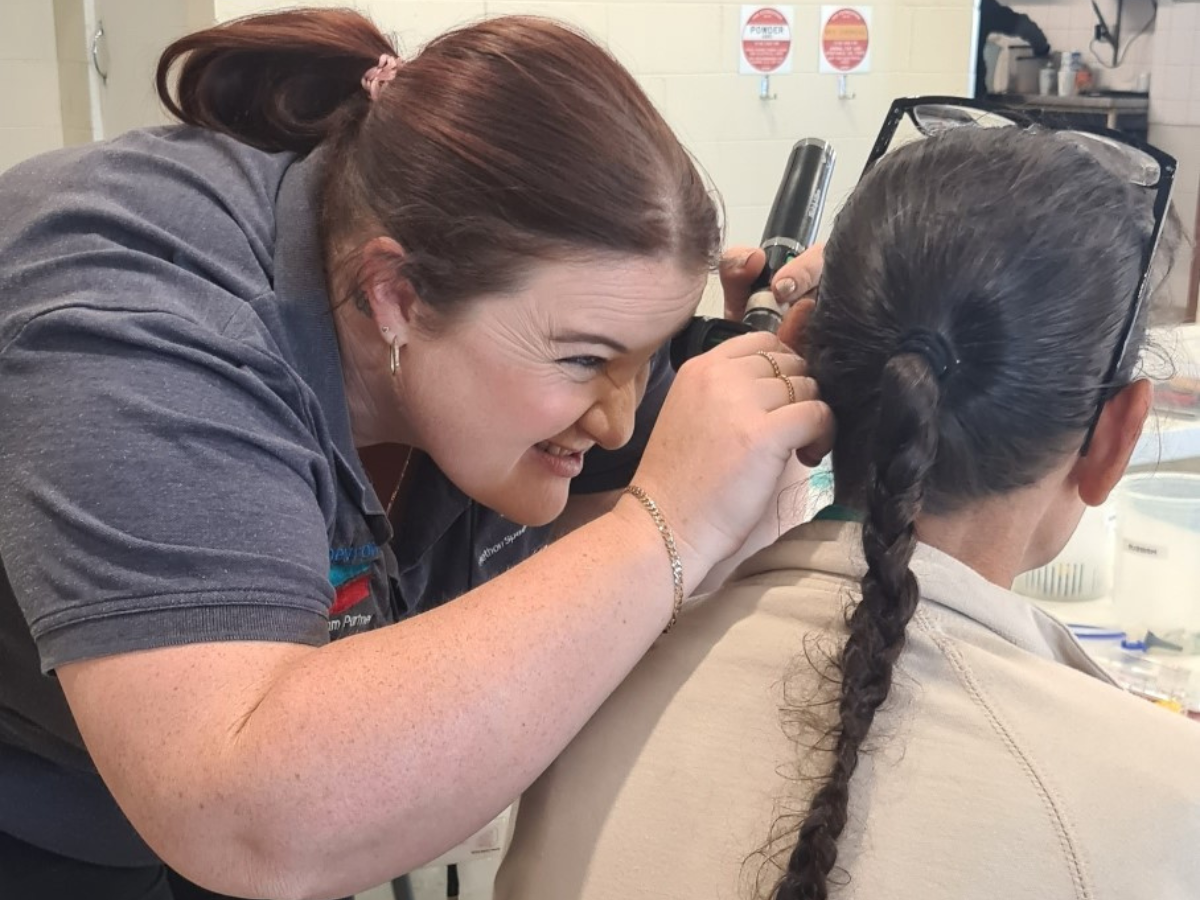
Thanks to a $8,904 SRC grant supported by the Sidney Myer Fund, Telethon Speech & Hearing Inc was able purchase cutting edge screening technology to streamline its early detection and surveillance of hearing loss at early childhood centres and primary schools across the Pilbara, Kimberley and Wheatbelt regions of WA. Many children in these regions are at risk of developing chronic ear health conditions, which impact all facets of their life including social, behavioural and academic performance, if not addressed early.
The HearX apps and four digital devices have enabled screening and clinical hearing tests to be undertaken in a faster, more reliable way. The software supersedes traditional devices, so that ear screenings can be conducted with a tablet. This was particularly important for Telethon when its regular ear health clinics had to be cancelled due to COVID and a major flood in Onslow. Fortunately, Telethon’s locally based team was able to upskill early years educators, teachers and nurses to undertake the screenings and Telethon’s audiologists could then analyse data and generate reports remotely.
“We have since integrated a tele-health component into our audiology service offerings, allowing our locally based teams to screen children and liaise with our Perth audiology team in real time. This has allowed us to diversify our service delivery modalities, ensuring more frequent hearing supports than would otherwise be on offer pre-COVID.”
Beyond the Bell Great Southern Coast applied to the In a Good Place program, on behalf of the Southern Grampians Live4Life Partnership Group, for funds to support the implementation of the Live4Life model in the Southern Grampians Shire.
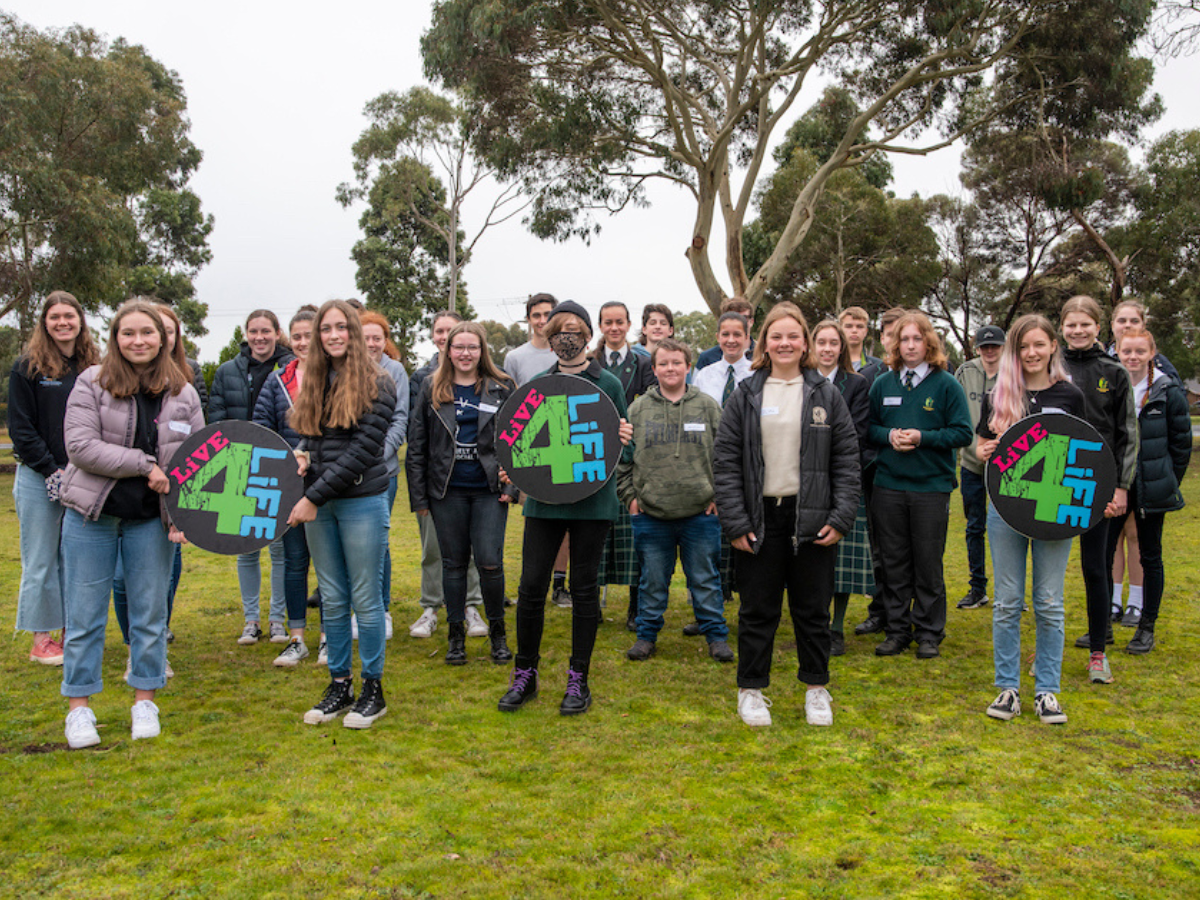
Live4Life is a community-grown, evidence-based, rural youth mental health model designed to prevent youth suicide. The Live4Life model aims to ensure that young people, teachers, parents and the wider community are better informed about mental ill health so they can be proactive in identifying the signs and symptoms of an emerging mental health issue before a crisis occurs.
The Live4Life model focuses on an ‘upstream’ approach to mental health education and suicide prevention to build resilient young people and communities. This is achieved by ‘wrapping’ protective factors around young people such as supportive relationships, support at critical times, positive help-seeking attitudes, connection to family, school and community and positive peer role models.
The school-based project to support Youth Crew activities and mental health education was all geared up ready to go when COVID first struck and schools and communities across the country went into lock-down.
After a year of navigating the challenges of not being able to deliver face-to-face programs and other challenges such as the loss of the Youth Engagement Officer, who normally coordinates the crew activities, the group developed new strategies and approaches that enabled them to successfully deliver the activities in a COVID-safe manner, including a new model of blended Youth Mental Health First Aid (YMHFA) training.
The group was highly successful in maintaining the momentum of the project, despite delivering a personal development program and training in a lock-down environment. They launched a social media presence on Instagram during Mental Health Week and created various collateral and promotional materials such as stickers, posters and help-seeking flyers to use in info packs to be distributed to students at in-school promotional events.
Once the Partnership Group was able to recommence activities within the community, they successfully delivered a series of Leadership and YMHFA courses and training sessions using a mix of face-to-face session and a blended online model via Zoom, reaching across six schools and eight allied community-based organisations that work with young people.
The organisation reported that what they were most proud of about the expansion of the Live4Life project into the Southern Grampians Shire, which they estimate has directly benefitted at least 950 people, was the engagement of the young people who joined the Live4Life CREW. They also mentioned the local YMHFA Instructor training, which has increased the community’s capacity to deliver more training across the Southern Grampians region.
The lastest news on the project from the Southern Grampians Live4Life website reports:
The project has led to increased community capacity and shared awareness of preventative mental health strategies through the MHFA training, as well as a deeper engagement with the Partnership Group in a broader context. They report that there is a noticeable increase in collaboration across the Southern Grampians area, possibly due to participation in the Live4Life initiative that connected people and agencies / organisations, and promoted collaboration centred on young people in the Shire.
“I think the most rewarding part of being in the Crew is seeing the difference you’ve wanted to achieve happen. Getting people into the idea of talking about mental health is hard but I think it’s slowly starting to happen, with the Crew being a part of that change.” – 2023 Crew member, Southern Grampians
The beautiful Mid-North Coast of NSW is Gumbaynngirr country, with 15,000 Aboriginals living across the region. COVID had significant impacts on the health and wellbeing of local Gumbaynngirr women in particular: local services found it difficult to meet the needs of community, while research conducted with Gumbaynnggirr people on the ramifications of COVID reported that the restrictions on social connection had serious negative impacts on social and emotional wellbeing and overall health.
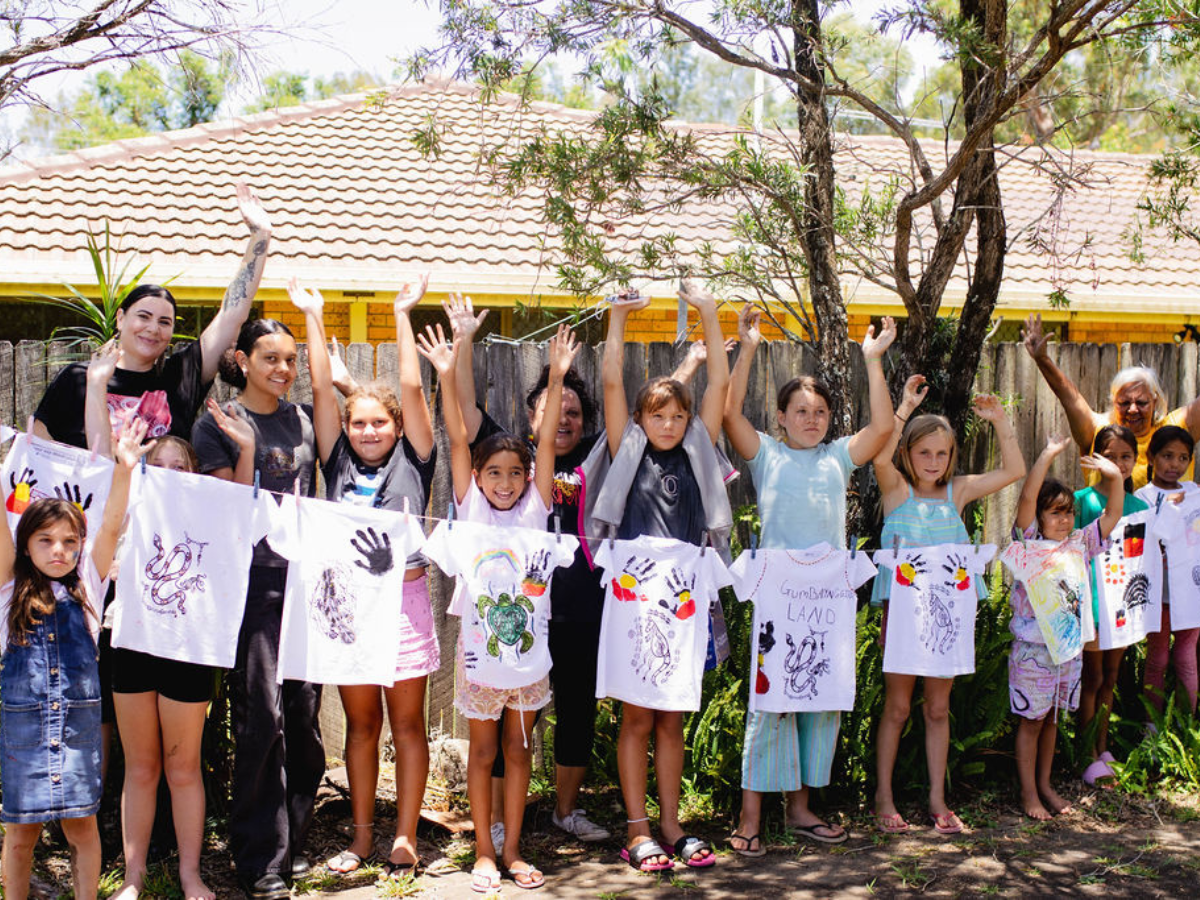
Based in Toormina at the southern end of Coffs Harbour, Happy Boxes Project Ltd aims to alleviate barriers to accessing self-care items for Aboriginal women in remote communities by providing packages of self-care products such as soap, deodorant, and shampoo – otherwise known as ‘Happy Boxes’). Recognising the impacts that COVID-19, Happy Boxes capitalised on their connections to the local community to significantly scale up services and programs at their new community hub: Nyami Gawbarri (Women Gathering).
Nyami Gawbarri was able to support local community members to volunteer their time in the space to pack Happy Boxes for remote communities. Together they were able to pack and distribute 689 Happy Boxes to 22 remote communities throughout Australia. This meant that at least 689 women didn’t have to go without essential hygiene products.
In addition, the Happy Boxes team hired a number of local Aboriginal women to provide programs for hub users and consequently the hub went from being open one day per week to five days, offering programs on topics ranging from cultural meditation, Aboriginal art and cooking, to a five-week program called ‘Mob Radio’ – teaching local teenagers how to be radio presenters.
Critical health services that have traditionally had social barriers to access, such as cervical screening programs, also ran out of the hub. Another outcome of being open five days per week was the creation of an Intensive Support Reintegration Program for teenagers consistently being suspended and disengaged from school. Local schools are now referring their students to Nyami Gawbarri as the organisation can provide a culturally-safe space to spend their suspension, giving back to the local and national communities.
The impact that the project had was described by a local participant:
“The programs for these young women will positively change lives. Providing opportunities for connection and supporting our young women to develop their identity and sense of belonging will have such a huge life lasting impact for them, their families and our Community. Nyami Gawbarri is supporting the development of proud, determined and connected young Jindas.” ~ Anonymous
The level of need for Nyami Gawbarri, and the positive impact that the program of activities over the last twelve months has had for the hub has meant that Nyami Gawbarri is now evolving to become a separate entity and permanent community hub for Gumbaynnggirr women. Critically, throughout this period the project coordinator was able to secure government funding for their role, and hence will be able to continue Nyami Gawbarri’s commitment to provide a culturally-safe space and a plethora of programs beyond the completion of the FRRR-funded project.
Emma Sullings, Chief Executive Officer of Happy Boxes Project Ltd, explains the impact that this grant has had for the hub and the community:
“We are extremely proud of the establishment and succession of a community hub. Nyami Gawbarri stands as a testament to the significance of creating dedicated spaces for women to access a range of services and programs tailored to their unique needs. It is a symbol of community strength, unity and empowerment.”
This inspiring hub has capitalised on opportunity and scaled for the community good – and in the process, showcased how support for locally designed and led initiatives can have long-running positive outcomes. These impressive efforts were supported by a $50,000 grant from FRRR’s Strengthening Rural Communities – Rebuilding Regional Communities program, funded by the Australian Government.


